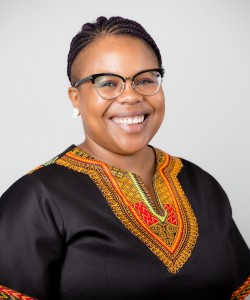
Lerato hails from the Batuang Clan of ba ha Moletsane from Lesotho in Southern Africa and lives as an uninvited guest on the unceded and occupied territory of the xʷməθkʷəy̓əm (Musqueam) people where she lives with her two sons.
As the inaugural Associate Director for the Indigenous Research Support Initiative, Lerato plays a strategic role in providing support to Indigenous communities, researchers and other partners working on Indigenous research collaborations. Lerato works to understand how policy, systems and procedures can enable reciprocal and ethical relationships in community-university research collaborations and how these support Indigenous engagement and address systemic racism on individual and system-wide levels.
Lerato has more than 18 years’ combined experience in anti-racism, community-based research, economic and social development with Indigenous communities, policy development and employment equity law. She has worked across a range of specializations including law, business and economic development, natural resources, community wellbeing, and government relations.
Outside of UBC, Lerato serves as a member of the Board Executive for the Canadian Black Policy Network and previously served as Vice-Chair for the Racial and Ethno-Cultural Equity Advisory Committee (2021-2022) that advises Vancouver City Council on enhancing access and inclusion for Vancouver’s diverse cultural communities.
Prior to moving to Vancouver, Lerato practiced as a candidate attorney and legal consultant in South Africa, specializing in Labour Law and Employment Equity. She has a B. Com and an LL.B from Rhodes University in Grahamstown, South Africa and an MBA from the Beedie School of Business at Simon Fraser University in Vancouver, Canada. Her broad praxis focuses on decoloniality, intersectional equity, anti-Indigenous racism and anti-Black racism. Lerato is also very interested in exploring new approaches to recognize and centre different knowledge systems, how these are evaluated in our public institutions and how they are reflected in policy considerations.
